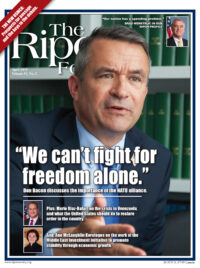
I was one of the original co-chairs of the Arms Control Observer Group, put together by President Reagan in the 1980s to ensure unity of purpose between the executive and legislative branches on arms control with the Soviets. I was a floor manager for every arms control treaty that came before the Senate from the INF Treaty in 1987 to the New Start Treaty in 2010.
In conjunction with the Nunn-Lugar program, I witnessed the safeguarding or dismantlement of just about every type of weapon of mass destruction imaginable in the former Soviet Union, from Typhoon submarines and SS-18s, to Backfire bombers, millions of VX-filled artillery shells, and laboratories housing anthrax and plague.
I mention this history to make a point: Our relationship with Russia and our mutual interest in constraining the threat from weapons of mass destruction is a long game, not a short one. That being said, there can be no breaks in our determination each day to prevent disaster. I fear that President Trump’s decision to withdraw from the INF treaty is short-sighted and not in our long-term national interest.
I fear that President Trump’s decision to withdraw from the INF treaty is short-sighted and not in our long-term national interest.
Let me explain why. First, the Russians are in violation of the INF Treaty. But Russian violations are not a new phenomenon. A major feature of every arms control debate since 1987 was discussion of actual or potential Russian violations. Every President has dealt with this. I believe it is easier to expose, counter, and reverse those violations with the INF Treaty than without it.
Second, arms control is not just about limits on weapons. Much of the value of agreements comes from verification provisions. There is safety in transparency.
Our strategic relationship with Russia was never better than when Russian and American technicians were working together on Nunn-Lugar projects to circumscribe the decaying Russian arsenal under provisions of active arms treaties. We knew a lot about each other, and we were talking every day. The worst thing we can do is undercut verification procedures that give us a window on Russian activities and capabilities.
Third, effective arms control is less about negotiating brilliance than it is about the accumulation of leverage. Withdrawing from the INF Treaty does nothing to bolster our leverage. It foolishly plays into the hands of Russian propagandists by focusing global attention on our rejection of the treaty instead of on Russian violations.
It complicates relations with allies. And it signals to the Iranians, North Koreans, and others who would pursue a nuclear arsenal that we are devaluing our own historic legacy as the guarantor of legal frameworks designed to prevent nuclear proliferation.
Finally, regardless of near-term decisions on the INF Treaty, drifting towards unrestrained arms competition would be an incredibly hazardous outcome. This does not mean that the United States cannot modernize elements of its nuclear deterrent. But allowing verification procedures to expire and basing our security on the hope of winning an expensive arms race would be the height of irresponsibility.
Allowing verification procedures to expire and basing our security on the hope of winning an expensive arms race would be the height of irresponsibility.
This isn’t 1981. We live in an increasingly multipolar world that features cyberwarfare, suicidal terrorism, additional nuclear states, and increased avenues to nuclear proliferation. We also had a sobering budget deficit of $779 billion in 2018.
The bottom line is that jettisoning treaties that provide a legal framework for exposing Russian violations achieves nothing. We should be pursuing a consistent strategy that strengthens the Western alliance, makes sensible defense investments, and builds leverage that could put the arms control process back on track.
To do that we need much more consistency of purpose. The successful launching of an era of arms control by Presidents Reagan and George H.W. Bush was achieved largely because those Presidents projected a consistent foreign policy that undergirded international law, stood up to dictators, commanded respect, and united the free world. The United States returning to that posture would be a major setback for Russian oligarchs and would strengthen U.S. ability to press a new strategic dialogue based on mutual interest.
Senator Lugar is president of The Lugar Center in Washington, D.C. He served for 36 years as a Republican U.S. Senator from Indiana.




